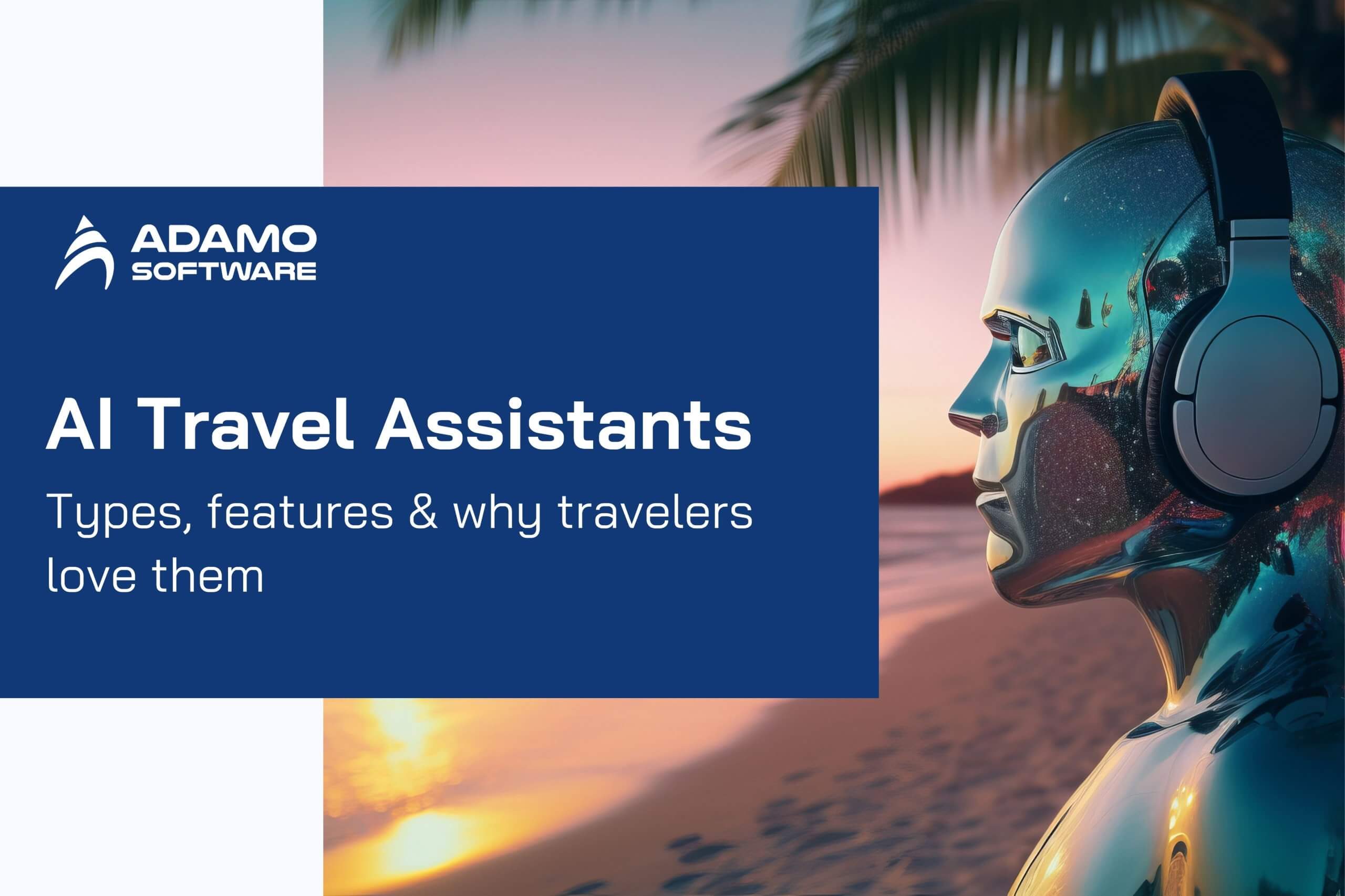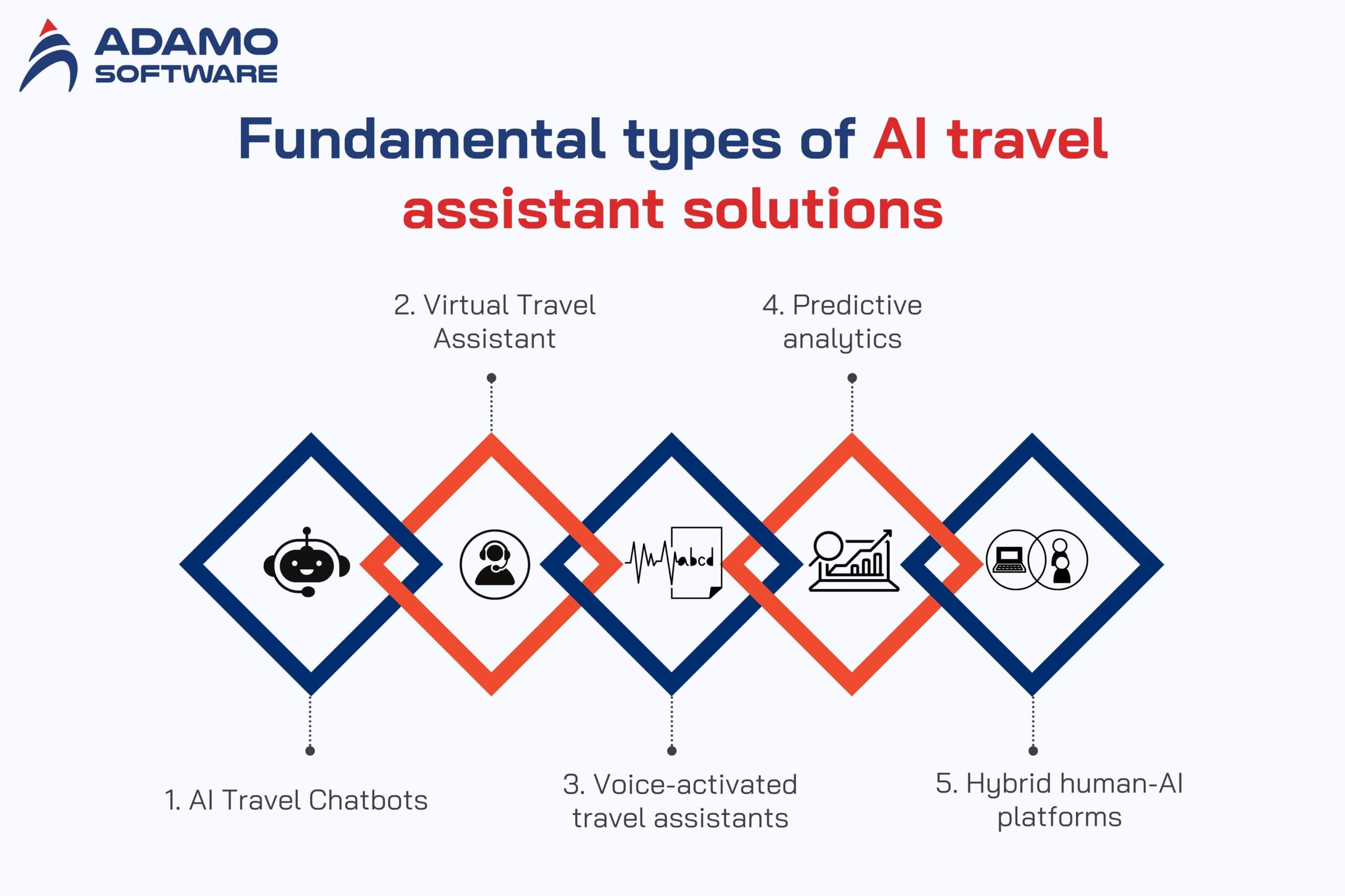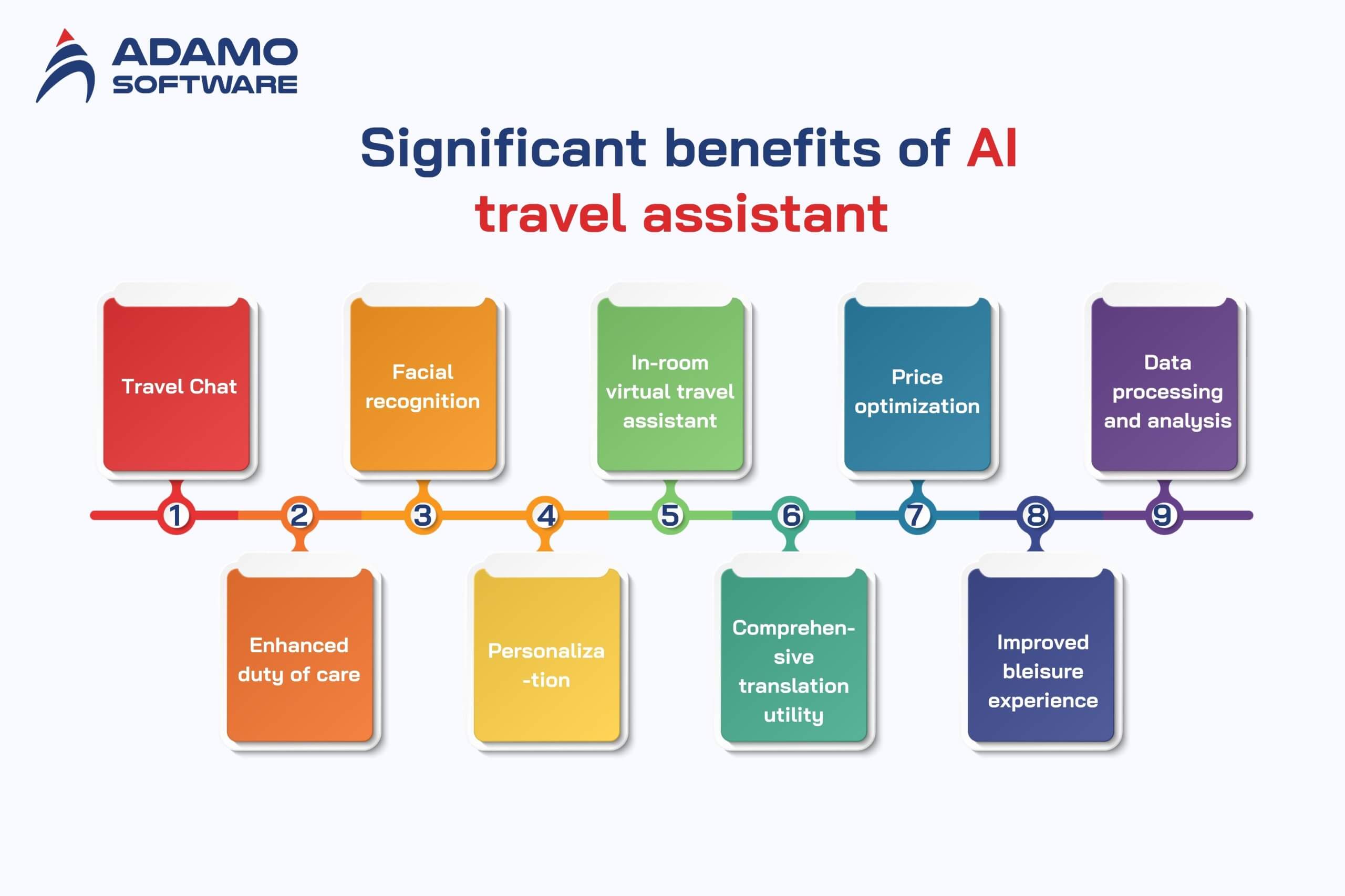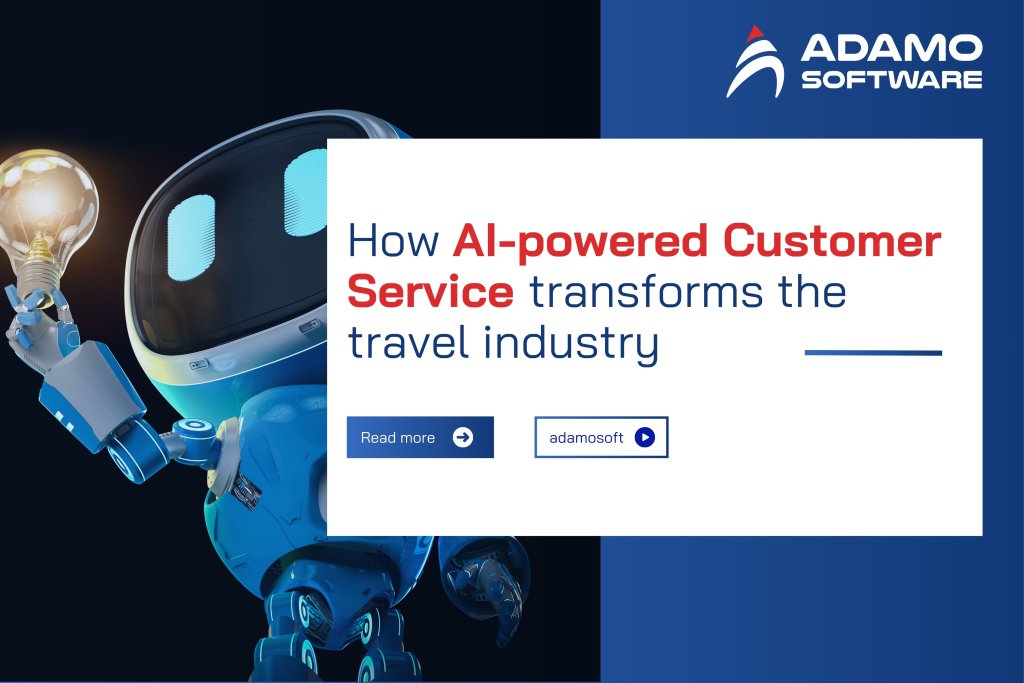AI Travel Assistants: Types, Features & Why Travelers Love Them

Discover what AI travel assistants are, their key features, benefits, and how they simplify travel planning for a seamless experience.
In today’s fast-paced travel industry, customer expectations are higher than ever — they demand real-time support, instant updates, and hyper-personalized experiences. That’s where AI travel assistants come in. Through research, these AI travel assistants simplify trip planning and processing and streamline the booking process, taking the hassle out of it for travelers.
These intelligent virtual assistants are changing how travel companies operate — from automating bookings and handling disruptions to offering round-the-clock support, even when human agents are offline. For companies that want to stay ahead of the curve, investing in a custom AI travel assistant isn’t just a trend — it’s a strategic move to streamline operations, improve customer satisfaction, and boost profits.
In this article, we’ll explore how AI travel assistants are reshaping the industry and what you need to know to build a solution that meets the evolving needs of modern travelers.
I. What is an AI travel assistant?
AI travel assistants are changing the game for modern travel businesses. Built on advanced technologies like ML and NLP, these smart tools help companies simplify the way they serve their customers. From handling travel inquiries and personalizing itineraries to forecasting travel trends, AI assistants make every journey step smoother — for both the traveler and the business behind the scenes.
II. Fundamental types of AI travel assistant solutions

1. AI Travel Chatbots
Thanks to their flexibility and wide range of uses, smart chatbots powered by AI have quickly become a go-to tool in the travel industry. Although typically affordable, with costs ranging from $10,000 to $100,000, many companies have still not adopted these solutions. The cost of developing an AI travel chatbot varies based on features, complexity, integration requirements, and the level of customization needed. Basic AI Chatbots with pre-built response capabilities is cheaper, while advanced AI chatbots with natural language processing, machine learning, and cross-platform integration are more expensive.
However, they are extremely useful for travel companies because they can handle customer requests in real-time, providing instant responses to questions about reservations, itineraries, policies, and more.
Its key capabilities are:
- Answer frequently asked customer questions (e.g., baggage policies, check-in times)
- Provide real-time travel itinerary updates — from departure times to flight delays — so they’re always one step ahead.
- Support with booking modifications or cancellations
2. Virtual Travel Assistant
While AI chatbots are designed to interact with users through text or voice, virtual assistants take things a step further. These smarter tools can handle a wider range of tasks — from managing schedules and setting reminders to answering more complex questions and integrating with multiple apps. Virtual assistants act like digital travel agents in the travel industry, offering personalized support, voice command capabilities, and real-time help. They ensure a smoother experience for travelers.
Their functions are:
- Provide more human-like interactions.
- Handle multi-way conversations and understand complex queries better than chatbots;
- They can handle tasks like booking hotels, setting reminders, or even automatically rebooking flights—making the travel process faster and more convenient.
- Suggesting advanced customized travel options, unlike AI chatbots that rely on pre-set responses;
- They work across various platforms like booking systems, calendars, and maps to seamlessly organize and manage every part of a traveler’s journey.
3. Voice-activated Travel Assistants
It might be time to take things further if your business already uses AI chatbots or virtual assistants. Have you considered integrating a voice assistant? With voice search growing rapidly—about 50% of US people use voice search daily—it’s clear that this technology is here to stay.
Voice-activated AI travel assistants like Amazon Alexa or Google Assistant allow travelers to access important travel information hands-free. Whether checking hotel availability, updating their itinerary, or getting real-time flight updates, they all need a simple voice command. This hands-free convenience is especially valuable when travelers are on the go or need quick, real-time assistance. By offering this feature, you can make your travel services even more seamless and accessible.
4. Predictive Analytics
The travel industry is evolving at a fast pace, and one key AI tool that’s gaining traction is predictive analytics. This type of AI assistant can significantly enhance how travel companies operate by providing insights into future trends, pricing, and customer behavior. Integrating your existing software with predictive analytics platforms like Google Cloud AI or Salesforce Einstein Analytics can give your business a competitive edge.
For example, the travel industry is rapidly changing, so predictive analytics can be used for dynamic pricing, helping you adjust fares based on demand forecasts. This maximizes revenue and allows for more personalized marketing by understanding traveler profiles and identifying emerging trends in popular destinations. Airlines, for instance, often leverage these tools to optimize their pricing strategies and boost their revenue while seamlessly integrating them into their current systems.
5. Hybrid Human-AI Platforms
As the travel industry evolves, developing an AI travel assistant is becoming a strategic move for companies looking to balance automation and personalized customer service. These human-hybrid platforms go beyond basic virtual assistants by combining the speed and efficiency of AI for routine tasks. These include dynamic booking and pricing with the human intervention needed for complex, hands-on situations like handling luxury travel or resolving customer disputes.
For example, platforms like Amgine, the customer service system from Booking.com, or TravelPerk use AI to automate corporate travel policies while allowing human agents to personalize itineraries to meet customers’ needs. This approach goes beyond virtual assistants like Google Assistant, which typically handle simple queries, by providing more tailored and responsive service to travelers. In the fast-paced world of travel, the combination of human expertise and the power of AI delivers a more flexible, efficient, and personalized experience.
III. Key features of AI travel assistant
1. Automated Reservation Management
Amid the rapid growth of digital platforms, approximately 65% of travel bookings are made online, while mobile bookings account for 35% of total sales. The automated reservation management features of travel AI assistants for travel agents:
Handle hotel, flight, and transportation bookings.
AI travel assistants can modify bookings, handle cancellations, and rebook trips as needed, ensuring smooth and hassle-free travel experiences for customers.
2. Personalized Travel Assistant
AI travel assistants provide tailored recommendations by analyzing travelers’ preferences and past bookings. From providing accommodation recommendations to transportation options, AI travel assistants ensure options are tailored to each individual’s needs.
3. Real-time updates and alerts
With airlines facing an average 20% flight delay rate in the US, real-time AI alerts for travel agents keep travelers updated and enable quick adjustments to their plans. Additionally, the AI travel assistant instantly notifies travelers of sudden changes or flight disruptions. They also provide important trip updates, ensuring travelers are informed and prepared.
4. 24/7 Customer Support
AI travel assistants handle common traveler queries, from baggage policies to immigration requirements. AI travel assistants offer round-the-clock support through digital and voice channels, ensuring help is always available whenever needed.
5. Seamless integration with travel platforms
Another key feature of AI travel assistants is their ability to integrate seamlessly with various travel platforms, enhancing the overall user experience. This feature helps connect with airlines, hotels, and even restaurants to improve the travel experience.
For instance, when a traveler books a flight using an AI travel assistant, they can instantly receive personalized hotel suggestions without switching platforms. Once checked in, travelers will be assisted with room service requests by the hotel’s AI chatbot. Or they will even be connected to a restaurant chatbot to make dinner reservations nearby.
6. Expense and Budget Management
Expense and travel budget management are top concerns for travelers. AI travel assistants help you track, manage expenses, and spend wisely on your trip. AI chatbots can also recommend booking options that match your company’s policies or specific traveler preferences. By automatically tracking expenses, travelers or businesses gain better visibility into their travel budget and optimize spending without manual oversight.
7. Multilingual Support
AI travel assistants help travelers communicate in their native or preferred language, making communication and interaction smoother and more convenient. In addition, these virtual assistants can also tailor responses and provide accurate translations.
IV. Significant benefits of AI travel assistant
AI travel assistants empower businesses to improve internal operations to meet customer expectations and make data-driven strategic decisions. By harnessing the potential of AI, companies can deliver exceptional customer experiences, operate more efficiently, and stay ahead in an increasingly competitive market. So, let’s explore AI travel assistants’ benefits and what they bring to businesses.

1. Travel Chat
Gone are the days when travelers had to go to a travel agent to book flights and hotels manually. This process was very cumbersome for travelers. Because researching flights, booking accommodations, and planning itineraries with agents was time-consuming.
Thanks to rapid advancements in technology, managing travel has become easier than ever. One standout innovation is the use of AI-powered travel chat tools — smart virtual assistants that allow travelers to get instant help, ask questions, and manage their trips more smoothly. These chats are usually available on websites, apps, or other mediums such as social media.
In particular, AI-based chat can act as a virtual tour guide in times of crisis. For example, travellers can connect instantly to chat to resolve their issues in a travel emergency, even outside business hours. This is something that may not be possible with a travel agent. Additionally, it saves time and money and provides real-time support to business travellers.
2. Facial Recognition
With approximately 1.3 million business trips taking place every day in the United States, smart technology is more important than ever. For example, facial recognition helps identify travelers by comparing them to a digital image that matches their skin tone, texture, and features. For example, hotels can use facial recognition to enhance customer information security by verifying the identity of guests before granting them access to hotel rooms or any other common areas. Therefore, facial recognition is an effective solution to manage large numbers of travelers seamlessly.
Additionally, airlines can use facial recognition to scan passengers’ faces to eliminate the need to print boarding passes and make the boarding process faster.
3. In-room virtual travel assistant
An online AI travel assistant is useful not only in helping travelers plan their trip but in providing support throughout their stay. In-room virtual voice assistants enhance the traveler’s experience, especially when traveling for long hours or being stressed after a business conference.
In-room virtual travel assistants offer guests the convenience of answering questions via voice command, enhancing the customer experience with hands-free and seamless support. For example, if travelers need to order food or want room service, they can use the voice-based device to message the hotel reception instead of calling or going there.
Furthermore, in-room voice assistants also perform advanced requests such as controlling the room temperature, turning the TV on and off, adjusting the lights, informing about the hotel’s meal service times, etc.
4. Price Optimization
Business travelers typically spend 30–50% of their trip expenses on hotel reservations, making accommodation one of the biggest expenses on business trips. However, not everyone knows how to find the best flights and hotels. AI virtual travel assistants are a solution to help travelers search and make smarter, more economical choices.
AI travel assistants use analytics and predictive capabilities to display the most affordable prices at all times. It identifies pricing strategies and displays options that match the optimal price depending on the traveler’s choices. For example, it suggests preferred flight times and the best time to book tickets. This helps travelers know competitive prices and the best time to book business trips.
5. Data Processing and Analysis
Leveraging data helps companies optimize their travel processes by identifying areas for improvement. This also enhances the overall traveler experience. It can collect and analyze historical traveler data to provide insights on ways to reduce booking costs. This helps improve the traveler experience and wellness, increase business travel sustainability, and get a higher ROI from each trip.
Furthermore, an advanced AI-based virtual travel advisor like ITILITE Mastermind also pinpoints specific areas of travel cost leakage. It then conducts an industry benchmark assessment and provides a step-by-step action plan to fix the cost leakage.
6. Enhanced Duty of Care
Travel agents can feel trapped in worst-case scenarios like natural disasters or any business travel mishaps. AI travel assistants serve as virtual guides for risk management, assisting travel managers in ensuring their duty of care. They can instantly alert managers via SMS, voice message, or email if an employee encounters an emergency. This helps them know the location of their employees in real-time. Additionally, the AI travel assistant also uses machine learning to provide insights into the location of business travelers through itineraries, corporate card details, and many other sources.
7. Personalization
In general, travel managers are often very busy with tasks such as managing trips, handling various contracts, coordinating with finance teams, etc. However, they must ensure business travelers have the best and most comfortable travel experience.
Booking based on the options provided by the company instead of using the preferred booking engine can affect the customer experience. This affects company policy and reduces visibility during the booking process. Travel service providers can analyze and collect data using AI travel assistants to understand travelers’ preferences and needs.
Machine learning algorithms can predict and recommend the most suitable options for travelers based on previous bookings and experiences. The options will be adjusted to prioritize the traveler’s preferences and the company’s policies. Therefore, it also helps to make booking faster and more convenient, saving time.
8. Comprehensive Translation Utility
There will be times when business travelers have to visit foreign countries or non-English speaking countries. This can cause language barriers when taking a taxi or asking for directions. This can be difficult or troublesome for them.
Travelers can use AI travel assistants to easily navigate language barriers and enhance communication during their trips. In addition, with AI translation applications such as Google Translate, travelers can communicate more easily by translating multiple complete sentences in context. This helps them communicate with locals, vendors, and taxi drivers without hassle.
9. Improved Bleisure Experience
Bleisure travel is an extension of business travel. They include leisure activities like sightseeing and adventure sports, which have become a popular trend in the business travel industry. These trips have become a common trend in the business travel sector.
AI travel assistants provide travelers with destination information directly on their smartphones. This is made possible through advanced beacon technology – a small wireless Bluetooth device that transmits signals that smartphones can pick up.
So, whenever a smartphone comes into contact with a beacon installed at a tourist destination, the traveler will be notified about that location. This way, travelers can get personalized recommendations about tourist attractions such as museums, cafes, or other destinations they can visit during their free time.
You can also explore how AI-powered Customer Service is transforming the travel industry here.
V. Adamo Software is an ideal partner for deploying custom AI travel assistant

Choosing the ideal AI travel assistant developer is a challenge. When you select an AI-powered tool development company, you need a partner that delivers long-term value.
Adamo Software customizes AI solutions to fit your business needs rather than providing one-size-fits-all models. Our dedicated team builds AI ethically, ensuring fairness, transparency, and compliance. Additionally, we provide ongoing support after launch and continuous AI improvements. This makes us the ideal choice for you when choosing a travel and hospitality software development company for long-term success. Contact us to deploy a custom AI travel assistant.





